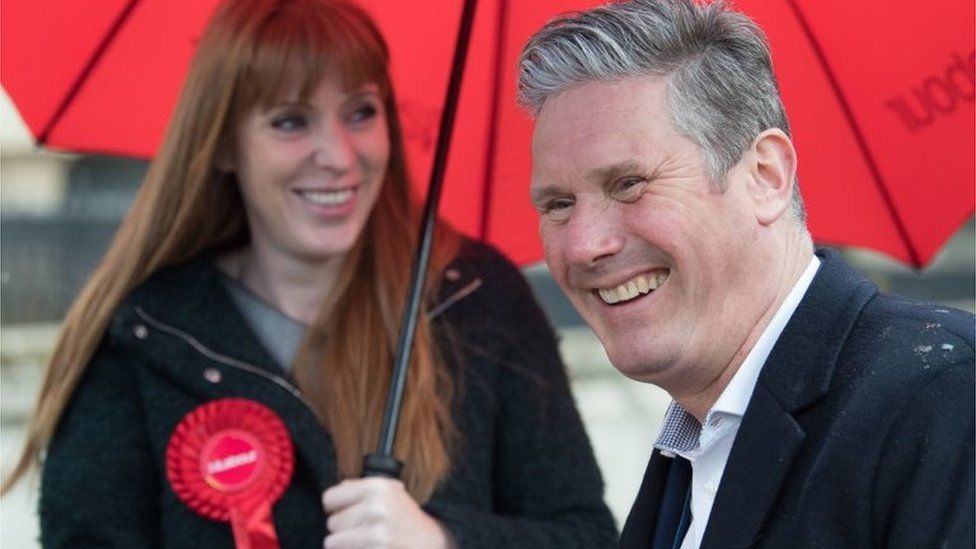Elections 2021: Labour's deputy leader Angela Rayner sacked as party chair
- Published

Labour's deputy Angela Rayner has been sacked from her roles as party chair and campaign coordinator following poor results in the English local elections.
The party lost control of several councils and suffered defeat to the Tories in the Hartlepool by-election.
Leader Sir Keir Starmer is expected to reshuffle his frontbench team in the next few days.
Ms Rayner will remain deputy leader of the party as it is a position directly elected by the party members.
She is also expected to be offered another shadow cabinet role.
A Labour source said: "Keir said he was taking full responsibility for the result of the elections - and he said we need to change.
"That means change how we run our campaigns in the future. Angela will continue to play a senior role in Keir's team."
But Labour's former shadow chancellor John McDonnell said the decision to sack Ms Rayner was a "cowardly avoidance of responsibility" and accused Sir Keir of "scapegoating everyone apart from himself".
And shadow cabinet source said they were "totally shocked", adding, "everyone is gobsmacked".
Labour's shadow schools ministers Wes Streeting said he had a lot of respect for Ms Rayner adding that she had a "big responsibility" along with Sir Keir to "lead the party to victory at the next general election".
He said it was "time to take a cold hard look at ourselves to make sure we are changing Labour for the good".
'Real changes'
Labour's Greater Manchester mayor Andy Burnham spoke out against Sir Keir's decision to sack Ms Rayner, tweeting: "I can't support this."
Speaking after his re-election on Saturday, Mr Burnham warned that Labour was still too "London-centric".
Mr Burnham said the party needed to connect with voters differently, and support more powers for English regions.
"I'm getting a bit fed up of saying this to them, but they really do now need to listen and make real changes," he added.
The results in England contrast to Wales, where Mark Drakeford led Labour to its best performance in elections to the Welsh Parliament, falling just short of an overall majority by one seat.
Labour has been in power in Wales - either in coalition or a minority - for the past 22 years.
Thursday's votes, including council and mayoral elections in England, are Labour's first major test since its crushing defeat at the 2019 general election.
Instead of recovering ground, the party suffered a series of setbacks in England, including losing overall control of councils including Durham, Sheffield and Plymouth.
The Conservatives also picked up control of several councils, including Nottinghamshire and Basildon, as well as winning Harlow from Labour.
In former heartland Tees Valley, Labour suffered a huge defeat to incumbent Tory mayor Ben Houchen, who increased his share of the vote to 73%.
But Labour did win mayoral contests in a number of areas, including taking the West of England from the Tories, while retaining others including London, Liverpool, Liverpool City Region, Doncaster and Salford.
On Saturday, the party's shadow home secretary Nick Thomas-Symonds said Labour had to do more to listen to voters who had abandoned the party.
He added that the party needed to "accelerate" changes under Sir Keir's leadership, and would be launching a "root and branch policy review".
He contrasted the party's performance in England to a better showing in elections to the Welsh Parliament, where he said as a party in power it had a "credible, radical policy offer" to put to voters.
Speaking on Friday, Sir Keir Starmer said Labour had "lost the trust of working people."
He added the party had "not made a strong enough case to the country", but he took responsibility for "fixing things".
Figures on the left of the party have accused him of not doing enough to challenge the government since taking over as leader last year.
Questioned about leadership ambitions, Mr Burnham said he loved the job he had just been re-elected to do and that was his priority.
He added: "I'm not just going to put myself forward unless they needed me one day in the future. But we're not at that day."
The Labour leadership's response to poor results in England will be both political and organisational.
There will be a reshuffle of the shadow cabinet, and more staff will be moved out of London to regional offices.
The policies Sir Keir Starmer inherited from his predecessor Jeremy Corbyn will also be formally reviewed.
Labour peer Lord Mandelson - who has advised Sir Keir's team - called for this review and envisaged the process running for 18 months to two years.
Labour sources say that Sir Keir could use the exercise not just to distance himself from the 2019 manifesto, but to move away from some of the policy pledges he made in last year's leadership contest - which had been designed to appeal to the party's left.
Among those to criticise the party's direction under Sir Keir is Khalid Mahmood, who quit as a shadow defence minister around a month ago.
Speaking on Friday, he said Labour had been "captured" by a "London-based bourgeoisie" and had "lost touch with ordinary British people".
The Birmingham Perry Barr MP said the party needed to focus on supporting jobs, particularly in advanced manufacturing, in areas that felt left behind.
And former leader Jeremy Corbyn, who has been suspended as a Labour MP under Sir Keir, said the party needed to present a "real, radical alternative".
"Offering nothing, offering insipid support for the government, causes people either to vote for somebody else or simply to stay home and disappear," he said.
- POSTCODE SEARCH: What are the results in your area?
- VOTE: Why full results might take longer
- BBC: How to follow the election results
Related Topics
- Published7 May 2021
- Published7 May 2021
